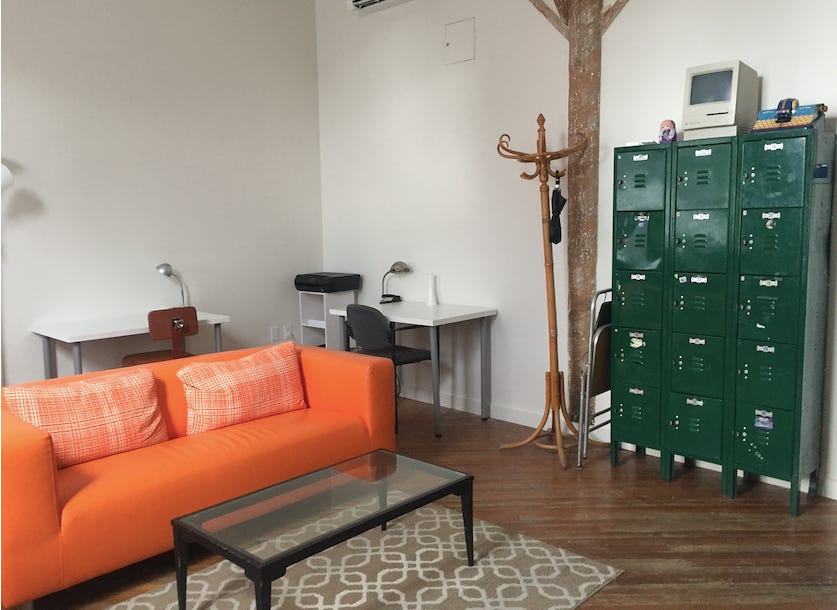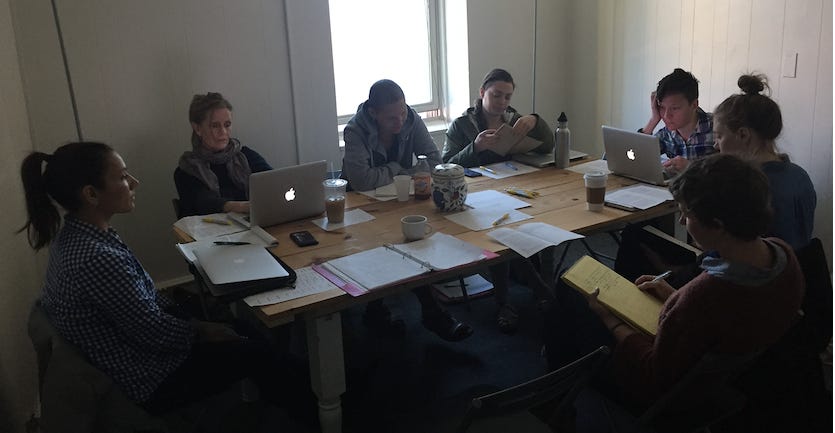Goodbye to All That...Co-Working and Community
R.I.P. Kingston Writers' Studio, 1/1/2017 — 3/16/2020

This week I had to make the difficult decision to shutter Kingston Writers’ Studio, the tiny co-working space for writers that I launched in January, 2017.
Actually, I should say it was a painful decision rather than a difficult one, because coronavirus really made the choice for me. Bottom line: you can’t effectively co-work in a deadly pandemic, the end of which doesn’t seem to be clearly in sight — especially not in a space that is just 270 square feet with six desks that are not the recommended six feet apart from one another. Also, you can’t visit an office building with common entrances, communal spaces, and public restrooms each day without risking your life.

(I had cute tote bags and everything. ^^^)
The irony is that I created the studio as a way to combat my feelings of isolation as a writer living upstate, and now an imperative for isolation is its death knell.
🌟🌟🌟
I can’t begin to tell you how hard it is for me to let this thing go. It took me years to get up the nerve and resources to put it together. I’d moved upstate from Manhattan in 2005, and while I came to love my new home, I also struggled with no longer being in bustling New York City, where so much of publishing and media are based. I missed interacting with so many colleagues so frequently, and being clued into important work opportunities. I feared that 90 miles north of the city, I would become out of touch and irrelevant.

(An April, 2017 personal essay workshop with Melissa Febos in the original studio in The Opera House building in Uptown Kingston.^^^)
I got lonely fast, but was in denial about it for a while. The advent of social media helped distract me from my loneliness, and allowed me to feel somewhat connected. After a while, though, I could no longer ignore the craving I felt for an active, well-connected writers’ community, and started meeting writer friends in cafes all around the mid-Hudson Valley.
Cafes weren’t optimal. I found it difficult to concentrate in them, especially when there was music with lyrics playing. Sometimes I’d get all the way to, say, Hudson, a 40-minute drive away, and realize I’d left a charger or my head phones, or an important notebook at home. Or I’d bump into people who were at the cafe to eat and socialize, rather than work, and my concentration would be shot.
🌟🌟🌟
In 2016, I started to hear about co-working spaces in the city and elsewhere, and envisioning starting one of my own. I paid day-visits to many of them to learn how they operated, and started scheming.

(A creative nonfiction workshop led by Chloe Caldwell at in the original studio in The Opera House building in Uptown Kingston.^^^)
I’ve always found it useful to write in the company of others who are also writing. The focus and concentration and accountability of others can be contagious. I knew I wanted to make this a regular feature of my work life.
I found a free online questionnaire service and polled all the local writers I knew, asking whether they’d be interested in a co-working space, and if so, at what price. About 20 people said they’d be in if I made it happen

(So many great members, visitors, workshops, events. I’m so grateful to everyone who participated in any way. Here, a sampling.^^^)
That year, I made an extra $5,000 and realized it would be a good decision, tax-wise and otherwise, to use that money to rent an office and buy some inexpensive furniture. Not having any idea how to be in business, I signed up for free mentorship through the Ulster County Small Business Association. My mentor, Jean, thought I was crazy. But she appreciated my passion for what I wanted to create.
🌟🌟🌟
In January, 2017, I opened up in two rooms in The Opera House building in Uptown Kingston. There was a weird, narrow extra room/closet we used as a sort of phone booth, which I dubbed the “Malkovich Room,” because of the way you had to wiggle into it.
From the start, I loved co-working with friends and colleagues at the studio. I became so much more productive than when I’d been working alone at home. It helped me emotionally, too, boosting my spirits, making me feel connected. We worked alongside each other, and took breaks, during which we socialized and networked. We helped each other find additional work, advised each other on choices we needed to make, encouraged each other to ask for more money, switch agents, retweet praise, forward positive emails about our work to our bosses. This was the community I’d craved. It was a life-line for me. It was the best.

(Jazmine Hughes in the “Malkovich Room” on a visit to Kingston. ^^^ Somehow it is the only photo I have of this room.)
A few months later I added a third room, with a big farm table, for holding writing workshops. Melissa Febos and Chloe Caldwell came and offered personal essay and creative nonfiction workshops. Susie DeFord offered poetry workshops. One week that July, Jen Doll and I offered a writers’ summer camp out of the studio, with workshops, lectures, karaoke, and a reading at the end. It was so much fun.

(Jen Doll and I emceed the reading at the end of writers’ camp.^^^)

(A publishing panel during writers’ camp, with Doubleday's Kristine Puopolo and Janklow & Nesbit's Mel Flashman and Paul Lucas ^^^)
But having three rooms to pay for was hard, as was keeping members on board when so many of them were struggling to survive. As much as they all loved the studio, and came back when they could afford it, many of them had moved upstate because they were struggling to make a living as writers.
I have zero business acumen, and am too uncomfortable asking people for money, so I made my rates too low, and membership too flexible. People came and went, month-to-month, as they needed, which meant that some months, the studio cost me a fortune personally, sometimes as much as $500 a month, which I didn’t have. (I’ve still never made back the money I put in. But I didn’t start the studio to make money; I did it because it was something I wanted and needed for myself.)
I needed to go back down in size.
🌟🌟🌟
In June of 2019, I moved Kingston Writers’ Studio to midtown Kingston, to the Fuller Building, a former shirt factory that was being renovated by local architect Scott Dutton. I kept it to a single, small room, and looked forward to when some of the large communal spaces in the building would be ready, so we could overspill into them as needed.
So many more writers started moving up from the city, reaching out, asking to join the studio. I didn’t have room, so I started Kingston Writers’ Association, a Google group for networking and gatherings. Lately we’ve been holding our gatherings on Zoom.

For most of the time that the studio has been in the Fuller Building, the building has been something of a construction zone. I have been so patient, and so excited for it to soon be done. I’ve been looking forward to making use of the nearly-completed communal spaces — like a sort of auditorium downstairs with a stage, where I’d hoped to hold readings and other events.
But now those hopes, and so many others, are dashed. I am making arrangements with movers, hoping there is some safe, social-distancing protocol for that. Now I’m co-working with my husband, Brian, in our dining room — at the farmhouse table that had once been situated in the KWS workshop room — and crying a lot, thinking about the ways in which this stupid virus is wreaking havoc on our lives.
When I consider how many people are dying, losing loved ones, losing work, losing money, this particular loss pales in comparison. I’ll get over it, and maybe some day, I can start this up again. But right now, it hurts.


